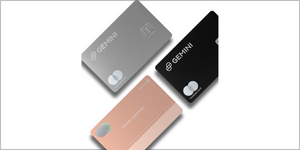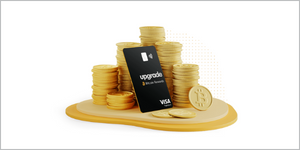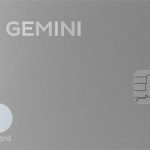Top Crypto Credit Card for Rewards
BlockFi Bitcoin Rewards. With 3.5% in bitcoin for the first 90 days and regular special offers for new users, the BlockFi Bitcoin rewards card stands out.

Top Crypto Credit Card for Support
Gemini offers incredible flexibility with over 60 cryptocurrencies for users who want more than bitcoin or Ethereum.

Top Crypto Credit Card for Low Fees
The Upgrade Bitcoin Rewards Card. The Upgrade Bitcoin Rewards Card has no annual, FX, or draw fees.

Top Crypto Credit Card Overall
Upgrade Bitcoin Rewards Card. Best overall for is its range of benefits. Unlimited 1.5% cash back, Fixed APR, Purchase Protection, and more.
Crypto credit cards (sometimes called bitcoin credit cards) are the next generation of credit cards. They look like a typical credit card and act like a typical credit card: you can generally use them anywhere Visa, Mastercard, or Amex are accepted.
(Don’t confuse crypto credit cards with crypto debit cards, which are more like a prepaid card. See our list of best crypto debit cards here.)
Typically crypto credit cards are issued by banks or financial institutions, who give you a credit line. Alternatively, you may have your credit limit linked to your cryptocurrency balance.
There are various benefits of crypto credit cards, including:
- Earning rewards in cryptocurrency (like cashback rewards, but in crypto)
- The ease of making purchases directly with crypto
- Withdrawing cash from an ATM without converting it back into fiat currency first
However, while these cards have benefits, smart investors must remember to spend responsibly, beware of tax obligations, and pay the balance off every month to avoid excessive interest fees.
Bitcoin Credit Cards Compared
We’ve rated and reviewed the best crypto credit cards on the market; read on for our top picks.
| Card | Fees | Crypto Supported | Crypto Rewards? | Availability |
| BlockFi Rewards Visa Signature Credit Card | 17.99% – 27.99% APR. No annual fees or foreign transaction fees. | BTC, ETH, DOGE, LTC, LINK, PAXG, BAT, UNI, BCH, GUSD, USDC, PAX, DAI, and BUSD. | Yes: 1.5% cashback. Rewards increase to 2% when spending over $30,000 annually. Also get up to 10% back at thousands of brands with BlockFi Offers, and 0.25% on eligible crypto purchases and trades |
United States |
| Gemini | No annual fees. APR: 15.99% – 26.99% variable APR. $10 or 3% for cash advances (whichever is greater). No ATM withdrawal fees. | Offers rewards in bitcoin, Ethereum and 60+ other cryptocurrencies (Full list). | Yes: 3% crypto rewards for dining (up to $6k annually then 1%), 2% for groceries, and 1% for other purchases | United States residents. Cardholders can spend with the Gemini card in outlets around the world accepting Mastercard |
| SoFi | No annual fees. APR: 15.99% – 27.99% for purchases and balance transfers. 29.99% for cash advances. Balance transfer and advance fees attract a $10 or 5% fee, depending which is greater. Late payment and returned payments up to $39. | Bitcoin and Ethereum. | Yes: 3% for the first year if you have direct deposit to a SoFi bank account. 2% afterwards. | Can be used around the world wherever Mastercard is accepted |
| Upgrade Bitcoin Rewards Card | APR: 14.99% – 29.99%. No annual fees. 1.5% fee for selling Bitcoins. | Bitcoin | Yes: 1.5% Bitcoin on purchases when the statement is paid. Up to 10% cashback with Upgrade Shopping powered by Dosh. | Upgrade Bitcoin Rewards Card is not currently available in Hawaii or North Carolina. |
 BlockFi Rewards Visa® Signature Credit Card
BlockFi Rewards Visa® Signature Credit Card
The BlockFi Rewards Visa® Signature Credit Card allows crypto-savvy individuals to earn cryptocurrency cashback on every purchase they make.
You apply for the card online by entering your name, email, and password. It’s open to U.S. residents with a BlockFi account, and you can use it at merchants that accept Visa.
Fees
17.99% – 27.99% APR. No annual fees.
Cryptos supported
BTC, ETH, DOGE, LTC, LINK, PAXG, BAT, UNI, BCH, GUSD, USDC, PAX, DAI, and BUSD.
Rewards
1.5% cashback reward, increasing to 2% after $30,000 spend
Availability
United States
Pros and Cons:
Pros:
- You can check for pre-approval without affecting your credit record.
- Additional benefits such as no foreign transaction fees.
- Potential to earn passive income from bitcoin.
Cons:
- Limited availability (United States only).
- Only available to business accounts, not personal.
- Limited to bitcoin.
Conclusion: The BlockFi Rewards credit card is good for customers who’d like to earn crypto on every purchase.
 Gemini
Gemini
Gemini is a cryptocurrency exchange that also offers a crypto credit card.
The company lets you spend your digital currency anywhere in the world just as you would with any other credit or debit card. The exchange provides over 50 types of cryptocurrencies, and deposits and account holders get their rewards immediately.
The card does not charge any extra fees for purchases or ATM withdrawals and offers other features like 24/7 customer support and fraud protection.
Fees
No annual fees. 15.99% – 26.99% variable APR. $10 or 3% (whichever is greater) for cash advances. No ATM withdrawal fees.
Cryptos Supported
Offers rewards in bitcoin and 60+ other currencies. (Full List)
Rewards
3% crypto rewards for dining (up to $6k annually, then 1%), 2% for groceries, and 1% for everyday purchases.
Availability
United States residents only. Cardholders can use the Gemini card anywhere in the world that accepts Mastercard.
Pros:
- Cryptocurrency awards converted in real-time.
- Cashback on dining, groceries, and other purchases.
- No annual or exchange fees.
Cons:
- High ATM withdrawal fees
Conclusion: The Gemini credit card is good for United States residents who dine out regularly, want to earn rewards in real-time and earn cashback for everyday spending.
 SoFi
SoFi
SoFi is a US-based financial services company that offers personal loans, mortgages and other banking services; it’s teamed up with Mastercard to offer cryptocurrency credit cards.
Sofi’s credit card comes with multiple benefits, including cashback for spending with high-profile brands like Lyft and DoorDash, and Mastercard ID theft protection.
Along with the 2% cashback, SoFi gives customers two reward points on every dollar spent when making eligible purchases.
Fees
No annual fees. Balance transfer and advance fees attract a $10 or 5% fee, depending which is greater.
Late payment and returned payments apply and cost up to $39.
Cryptos supported
Two – bitcoin and Ethereum.
Rewards
1% if used against your SoFi credit card account. 2% when paying off qualifying debt, saving or investing with SoFi.
Availability
You can use the SoFi crypto credit card wherever Mastercard is accepted
Pros:
- No foreign transaction fees
- Users who pay 12 minimum monthly credit card payments on time qualify for an APR reduction of 1%.
- Unlimited cashback.
Cons:
- To get the full 2%, card holders must use their rewards to pay down loans or redeem as cash back to a qualifying SoFi account. If you use rewards to pay off credit card debt, your crypto rewards falls to 1%.
- Higher transfer fees and cash advance fees than some competitors. Cash balance transfer fees are $10 or 5%, while cash advance fees are 3-5% or $10, depending which is highest.
Conclusion: SoFi looks like a great deal, but as usual it’s wise to look at the small print. T0 get the highest level of rewards, cardholders must hold a qualifying account, offering less value.
On the plus side, SoFi does offer some great additional bonuses like MasterCard anti-fraud protection.
 Upgrade Bitcoin Rewards Card
Upgrade Bitcoin Rewards Card
Upgrade’s offering is a bitcoin credit card that allows you to earn bitcoin rewards when making purchases.
You can pay down your balance in equal monthly payments in return for a fixed interest fee, making it easier to budget.
Another advantage of the Visa card is the ability to use it to access a personal loan that gets paid directly to your account.
Once you’ve earned your bitcoin rewards, you can let the balance grow and the NYDIG platform stores your coins. When you sell the bitcoin, they’re then applied as statement credit.
Your bitcoin rewards are subject to a 90-day holding period.
Fees
None, except Bitcoin fees of 1.5% when you sell.
Cryptos supported
Bitcoin
Rewards
Unlimited 1.5% cashback. Other benefits include baggage insurance,purchase protection, and extended warranty coverage
Availability
Not available in Hawaii and North Carolina.
Pros
- Lower monthly payments and no annual fees.
- Flexibility. Users can spend their crypto at Visa accepting merchants or transfer funds to their bank account.
- Fixed rate monthly payments.
Cons
- You can use the card to buy from retailers and ecommerce stores, but not for withdrawing cash from ATMs.
- 1.5% fee applies if you sell your Bitcoin rewards.
- Bitcoin rewards are stored on the NYDIG platform with no choice to transfer them to your crypto wallet.
Conclusion: Although the rewards could be more generous, the bitcoin reward credit card serves as an introduction to cryptocurrencies and their associated volatilities.
It also wins points for not having any fees, other than bitcoin sales fees and the usual APR.
However, the limitations on how cardholders can use the crypto rewards may seem too restrictive for some.
Comparing Crypto Credit Cards
Choosing a crypto credit card isn’t always easy and everyone wants different things. For some it might be dipping into crypto investment while reducing risk, for others it’s about earning a passive income.
Whichever crypto credit card you choose, don’t just look at the rewards rates. Look at the whole picture: the fees, ease of use, and availability.
To make the decision easier, we’ve provided a summary of what we consider the top cards.
However, remember the final choice is yours. Before choosing a card, ensure it gives you everything you want, check the terms, conditions, and fees, and keep in mind the fluctuating nature of cryptocurrencies.
Tips on Using Bitcoin Credit Cards
At Bitcoin Market Journal, we’re all about helping you make smart financial decisions using crypto. This goes double with bitcoin credit cards, which come with their own set of cautions.
Read the Fine Print
Problem: Crypto cards have complicated fee structures and lack of consistency between cards. This is because the “bridge” between digital and traditional payment systems (e.g., VISA and crypto) is still being built.
Solution: Do your homework. Some of these cards don’t have the same perks as traditional credit cards. They also have higher annual fees. As sexy as it sounds to earn bitcoin rewards, you may still be better off with a traditional credit card (once a year, you can still use your cashback rewards to buy bitcoin).
Make Sure It’s Really a Credit Card
Problem: Although many companies label their products as “crypto credit cards,” they don’t work the same way as traditional credit cards. Many are really crypto debit cards, where you’re taking funding from the crypto in your account rather than establishing a credit line.
Solution: Credit card companies should be clear about what is a “crypto credit card” and a “crypto debit card,” and educate investors on the pros and cons of each (as we’re doing here).
Be Sure It’s Available in Your Country
Problem: Because this industry is new, most cards are only available in certain jurisdictions, and all cards have conversion fees if you want to use them internationally. These international fees can be confusing; sometimes it’s cheaper to just pay cash.
Solution: Bitcoin credit card apps and websites should auto-detect your country and just give you clear language on where it can be used and the fees to use it internationally.
Beware of Processing Delays
Problem: Consumers are used to credit cards making instant transactions, but crypto doesn’t work that way. A single crypto transaction can vary from a few minutes to over an hour, or even a few days.
Solution: Bitcoin credit card apps should include clear communication on the transfer process and a constantly-updated “tracking number” (like FedEx tracking) that shows what’s happening.
Beware of Volatility and Fees
Problem: If you’re holding your native assets in crypto, understand that it can swing wildly in price from day to day. (As mentioned above, some “bitcoin credit card” providers convert you into a native token, which means now you have volatility and a different token.)
Solution: Bitcoin credit cards should have an easy three-swipe “tutorial” that walks you through how digital assets work, clarifying how your holdings may change over time.
Why Use Bitcoin Credit Cards?
For most investors, the best deal is a credit card that allows you to pay off your monthly balance in dollars, while giving you cashback rewards denominated in bitcoin.
In this way, you get the best of both worlds: it behaves like a regular credit card, but with the added bonus of earning crypto, which has delivered eye-popping returns over the last three years.
What is a crypto credit card?
A crypto credit card allows the owner to spend their cryptocurrency on real-world items without converting it back to fiat currency. What makes crypto credit cards most appealing to cardholders can also earn cryptocurrency rewards as cashback when they shop.
Like a regular card, crypto credit cards are subject to interest if you don’t pay your balance monthly and impact your credit record.
Annual fees, monthly fees, and charges for ATM withdrawals may also apply.
Pros and Cons of Bitcoin Credit Cards
| Pros | Cons |
| You can use them worldwide in outlets that accept Visa and Mastercard. However, depending on the card type, some geographical restrictions may apply | Some have limited options for spending your coins. |
| Risk-free access for cardholders new to crypto. | High conversion fees are associated with some cards. |
| Ability to hold both Fiat and cryptocurrencies. | Geographical limitations may apply. |
| Crypto cashback rewards and flexible spending. | The volatility of cryptocurrencies means any cashback may lose its value. |
Crypto credit cards vs. crypto debit cards
Crypto credit cards are sometimes used as a blanket term when discussing crypto debit cards, but there’s a significant difference between the two.
A crypto debit card allows you to purchase items the same way you would with any other debit card. These cards work in two ways: Prepaid, where you add crypto to your card, which then gets converted into fiat currency for spending.
The other type of crypto debit card is linked to your crypto wallet, and your cryptocurrencies are converted to fiat when you spend them.
You can use crypto debit cards in-store or withdraw cash from an ATM.
However, whichever card type you have, you can only spend the funds in your account.
With crypto credit cards, you’re effectively being loaned funds from the card’s lender, which you’ll pay back at a later date. Any rewards are paid in cryptocurrency.
How to choose the best crypto credit card
A crypto credit card can be a great way to spend your cryptocurrency without converting it back into fiat. But with so many options out there, how do you choose the best one? Here are some key features to consider when choosing a crypto credit card:
Card Issuer
Generally, a crypto credit card is available from established crypto platforms like SoFi. That means setting up an account with your preferred provider or finding out what card options are available from any platforms you’re already signed up for.
If you’re new to crypto rewards, research what’s available, and compare and contrast the cards based on your needs.
Reward rate
Your reward rate is how much you’ll get in cashback for each purchase, and these vary from card to card. Sometimes the reward rate may be conditional. For example, with some cards, you must have a qualifying account to earn the highest level of cashback.
Reward rates may come in as a flat or bonus rate when you purchase from a specific niche, while some cards only pay cashback in certain categories.
Fees
As with any other card, charges may apply to your crypto credit card. These may include:
Monthly fees: Not all cards charge a monthly fee, but it’s something to be aware of.
Foreign transaction fee: For card withdrawals outside of the US. These can range from 3% to 5%.
ATM withdrawal fees: These can vary from $2.50 to $3, sometimes more.
Annual fees: A fee charged once a year for the privilege of having the credit account.
For more crypto tips, don’t forget to sign up for our free blockchain investing newsletter.
- Bitcoin
- Bitcoin Market Journal
- blockchain
- blockchain compliance
- blockchain conference
- coinbase
- coingenius
- Consensus
- crypto conference
- crypto mining
- cryptocurrency
- decentralized
- DeFi
- Digital Assets
- ethereum
- machine learning
- non fungible token
- plato
- plato ai
- Plato Data Intelligence
- PlatoData
- platogaming
- Polygon
- proof of stake
- W3
- zephyrnet











